Semana Santa en Guatemala (Holy Week in Guatemala) Posted by sasha on May 8, 2019 in Spanish Culture
When I started doing research before our move to Latin America a few years ago, I had a list of things I really wanted to experience. Visiting Machu Picchu, hiking in Patagonia, seeing lucha libre in Mexico, and experiencing Holy Week in Guatemala were all high up on my list. A few weeks ago, I finally got to cross that last item off the list after spending some time in both Antigua and Lake Atitlan. Here’s a bit about my time celebrating Semana Santa en Guatemala.
An Intro to Semana Santa en Guatemala
Semana Santa (Holy Week) refers to the week preceding Pascua (Easter). La Semana Santa es la conmemoración de la pasión, la crucifixión y la resurrección de Cristo (Holy Week is the commemoration of the passion, crucifixion, and resurrection of Christ). This is a very important time in Latin America, where about 90% of the population are Christian.
Muchas personas viajan durante la Semana Santa en América Latina (Many people travel during Holy Week in Latin America). As a matter of fact, this is probably the busiest travel week of the year all across the region. One place that many people flock to is the city of Antigua, Guatemala.
The tradition of Holy Week came to Guatemala when the Spanish arrived there in 1524. Many centuries later, there’s perhaps no place on Earth that celebrates Semana Santa quite like Guatemala, specifically the colonial city of Antigua. The festivities actually begin much earlier on Miércoles de Ceniza (Ash Wednesday) at the start of the period known as Prestado (Lent).
Throughout Lent, all of the churches in Antigua host different vigils and processions. The vigils take place on Fridays and the processions on Sundays. Sometimes there are also children’s processions on Saturdays. During the vigil, the church will stay open all day so people can come see the sacred sculptures and pray. Believe it or not, many of these sculptures have been in Antigua for centuries, dating back to colonial times.
Each church will also make a very colorful alfombra (carpet) out of sawdust, pine needles, flowers, vegetables, and fruit. These are very meticulously arranged and can take many hours to finish. It’s not only the churches that put together the alfombras, as people all over town dedicate a lot of time and energy to making their own. Seeing the intricate alfombras around town is one of the best parts about celebrating Semana Santa in Antigua.
The highlight of Semana Santa in Antigua is without a doubt the amazing processions that take the town over. Las procesiones de Semana Santa en Antigua son las más grandes del mundo (The Holy Week processions in Antigua are the largest in the world).
During these processions, large groups of people known as las hermandades (religious brotherhood/sisterhood) carry massive andas (altars) depicting scenes from the Bible around town. The biggest ones can weigh several tons and take upwards of 100 men to carry. It really is an impressive sight to behold!
At the front of the procession there are people waving incense, filling the streets with the smoke and aroma that billows out of them. The men carrying the larger altars are known as cucurruchos, while the women who carry the smaller ones are called cargadoras. For most of Lent, they wear purple robes until they change into black on Good Friday to mark the death of Christ.
Being in the processions is definitely hard work, but the people who help to carry those massive floats actually pay to do so. It’s considered a big honor to be involved in the processions, and thousands of people contribute in order to be a part of them.
Los procesiones van acompañados durante todo el recorrido por orquestas musicales (The processions are accompanied throughout the tour by musical orchestras). They even have helpers dragging along the drums, lights, and generators to keep the procession moving.
Even though those alfombras take several hours to complete, the processions trample right over them. In an instant, the detailed design is nothing but colorful dust in the cobblestone street. Once the procession has passed, men with shovels swoop in and toss everything into a dump truck. At the tail-end of the procession, you’ll find vendors selling balloons, snacks, and even little figurines of the cucurruchos.
Celebrating Semana Santa in Antigua
Semana Santa actually kicks off quite early in Antigua, but the action really picks up around Domingo de Ramos (Palm Sunday), the day when Jesus entered Jerusalem and was welcomed by the people with branches of palm leaves. From here on out, there are processions and vigils every day for the remainder of Semana Santa.
The biggest day of the week is definitely Viernes Santo (Good Friday). In the late hours of Thursday, participants dressed as Roman soldiers parade through the city on horseback as they reenact the trial and sentencing of Jesus. Crowds begin to form at the La Merced church around midnight, and there are plenty of vendors working late to keep them fed.
Around 3AM, the famous Good Friday processions begin and continue for a staggering 18 hours or so. The floats that are used in these processions are the biggest and most impressive. One of them depicts Jesus carrying the cross and another the grieving Virgin Mary. The streets are packed full of people who stay up all night just to get a glimpse of the processions.
On Saturday, all of the floats depict a mourning Mary and are carried by women. It’s a very somber time as black robes replace the bright purple ones used in the other processions. That evening, people begin to celebrate the resurrection of Christ. The last day is a festive one, with colorful flags, fireworks, and a carnival-like atmosphere in the city’s Central Park.
Just like that, the Semana Santa celebrations come to an end. The streets are clogged full of people catching a ride on Guatemala’s famous chicken buses back to their hometowns, and things go back to normal in this quaint colonial city.
My Experience in Antigua
As I mentioned at the start of this post, I had been wanting to celebrate Semana Santa in Antigua for a few years. Last year we were fortunate enough to see the processions in Cusco, Peru, and this year we finally made it to Guatemala.
We decided to spend a few weeks in Antigua before Semana Santa started. This allowed us to take part in some of the vigils and processions minus the massive crowds that show up during Holy Week. It was a lot easier to get up close to them and take photos during those first two weekends!
After visiting Lake Atitlan for a couple of weeks, we headed back to Antigua to catch the end of the Semana Santa festivities. The procession on Wednesday night passed right by our hostel, so I was easily able to jump in and follow it for a while.
On Maundy Thursday, we walked around town admiring the alfombras. It was really amazing seeing how much effort and detail goes into making these. If you make it to Antigua for Semana Santa, be sure to carve out some time just to walk around town and find the alfombras before they’re trampled.
Even though we were exhausted, we managed to make it through the night to watch the Good Friday processions as they began at La Merced. I’m glad we did, because it was an experience I’ll never forget! I’ve seen a lot of interesting things in my travels, but the Holy Week processions in Antigua really are something special.
Unfortunately, we had to get out of town on Saturday so I could make it back to my hometown for a wedding. We had a great experience, though, and I’m just happy we finally got to be a part of Semana Santa en Guatemala.
If you have any questions, comments, or thoughts about the Holy Week processions in Antigua, please drop a line below!

Build vocabulary, practice pronunciation, and more with Transparent Language Online. Available anytime, anywhere, on any device.



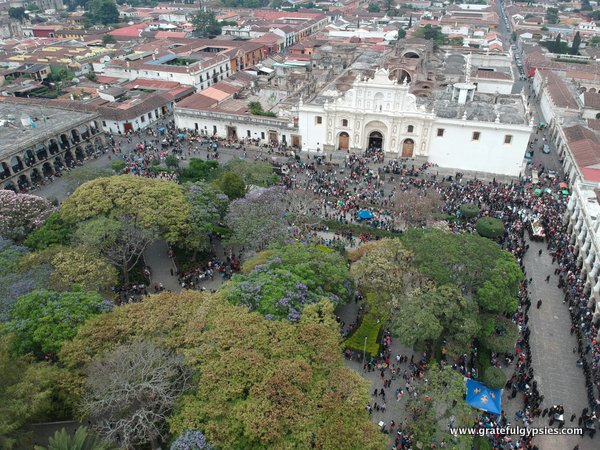

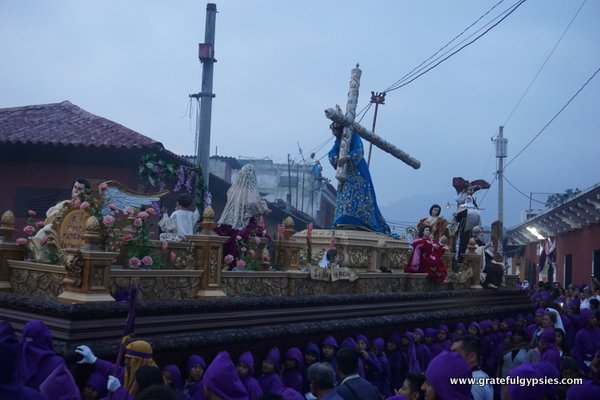
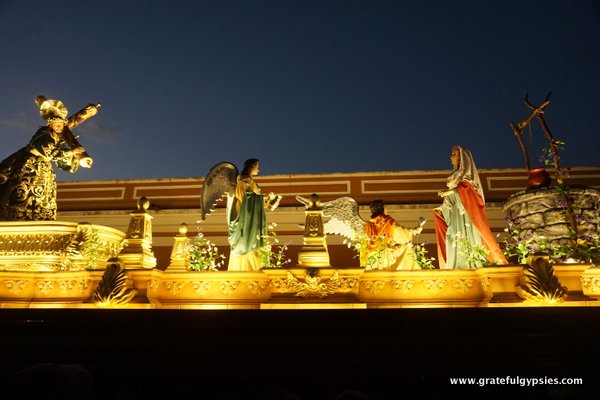
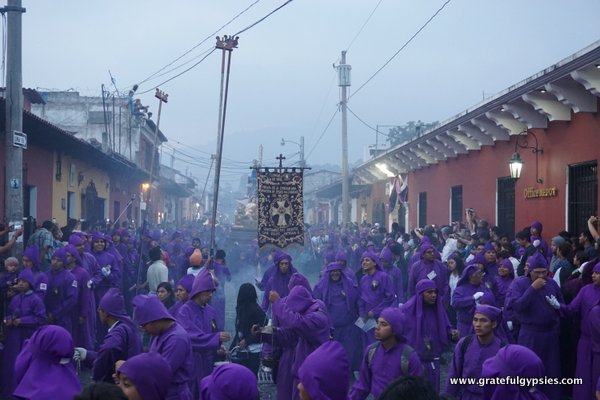
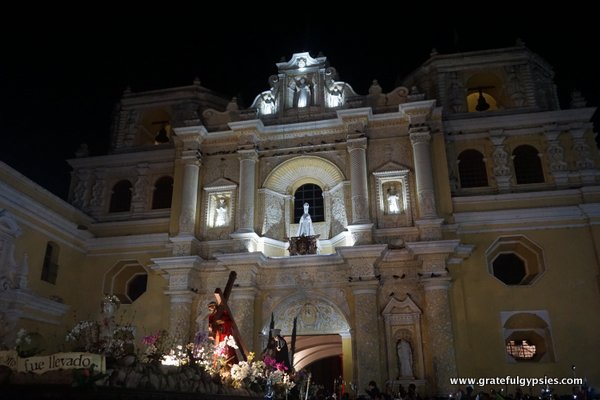
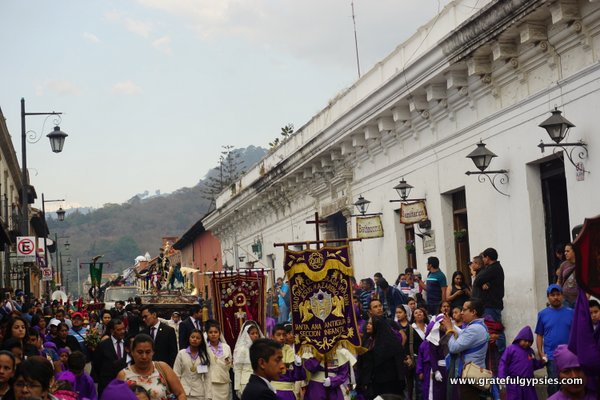
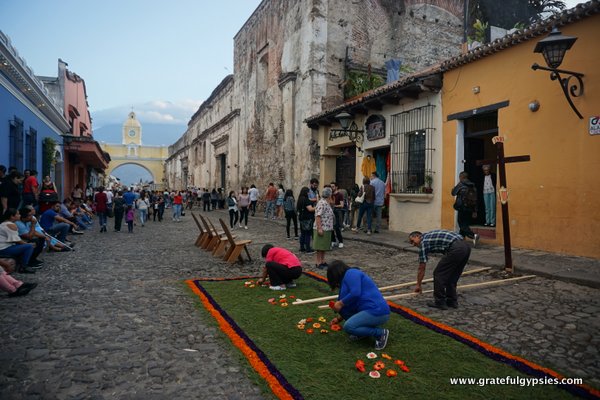

Comments:
Janet Sheridan:
In the third paragraph from the end, I think you mean MAUNDY Thursday?
sasha:
@Janet Sheridan Whoops! For some reason I always mix that up…